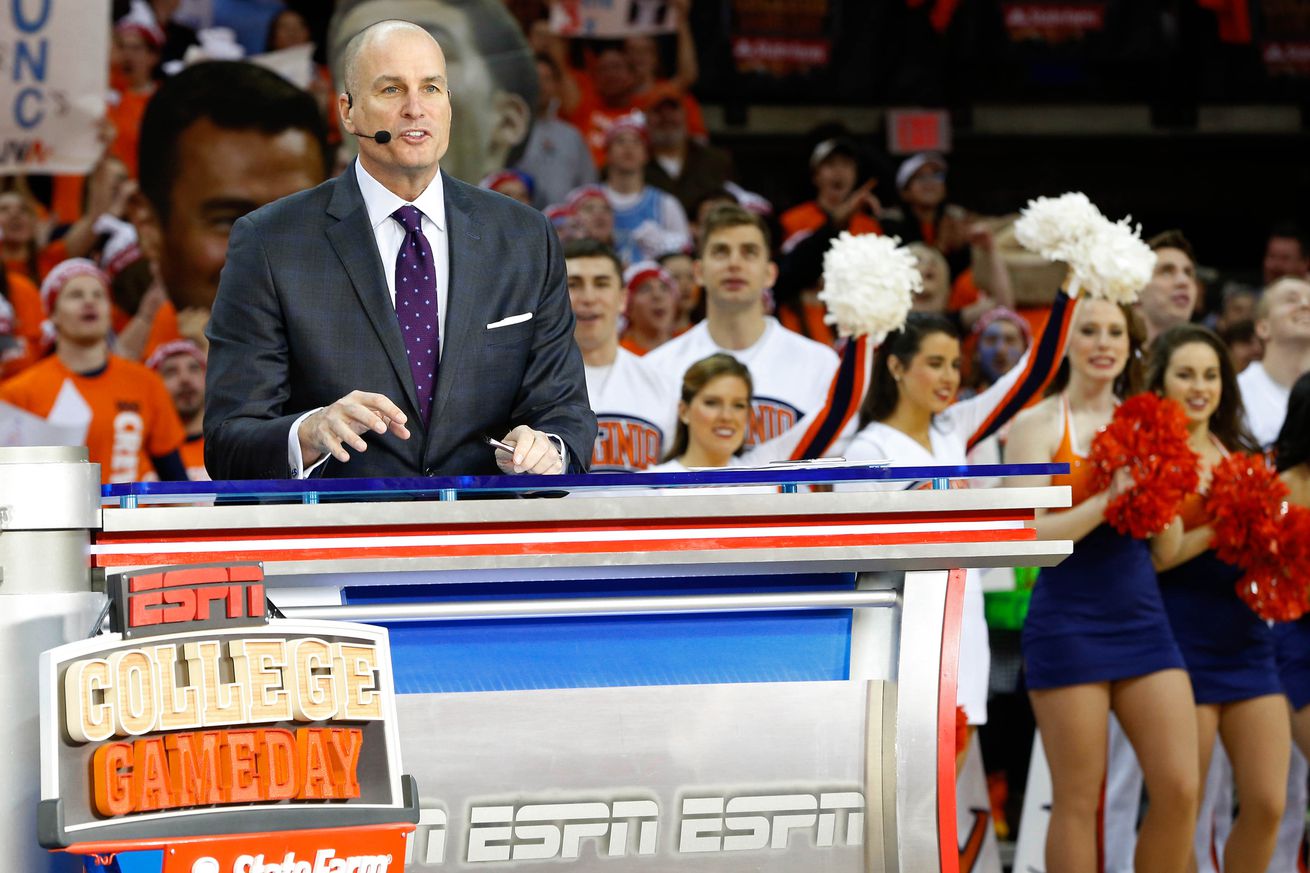Two ways too look at this situation for the ACC...
 We've known for awhile now that the other half of the Big Ten's media rights were still up for bid (FOX paid a handsome sum for the first half), and that they were negotiating first and foremost with current partner ESPN. From the looks of things today, those talks may not be going incredibly well...
We've known for awhile now that the other half of the Big Ten's media rights were still up for bid (FOX paid a handsome sum for the first half), and that they were negotiating first and foremost with current partner ESPN. From the looks of things today, those talks may not be going incredibly well...
Abundantly clear that ABC/ESPN might not be part of next B1G media rights package
— Teddy Greenstein (@TeddyGreenstein) May 18, 2016
That's not a definite split, mind you. But it's at least inching toward that result. As Land-Grant Holy Land points out, there are a lot of other partners that would probably pay the B1G more for the other half of these television rights than ESPN -- many more than were available the last time this issue came up, to be honest. ESPN getting gun-shy about these large rights deals is turning rights negotiations into much more competitive endeavors for the World Wide Leader's competitors. While ESPN worries about cord-cutting and how it impacts subscribers and (parent company) Disney's stock price though, it appears FOX and others are less concerned as they strive to grab marquee live sports properties.
Still, the money may not be enough to make this break happen. In the LGHL post, Matt Brown points to what happened when the ACC last flirted with leaving ESPN. The coaches, seeing the value of ESPN's exposure, pushed to make sure it didn't happen. That's much less likely to happen in the Big Ten, however, where Jim Delany lords over the league and its interests.
Assuming it DID happen in that case, what does this mean for the ACC? There are two schools of thought:
- The extra money hanging around from the loss of the Big Ten rights would allow ESPN to double-down on its second-largest remaining league property, the ACC (the SEC being the first, even with portions of that deal split out to CBS). We'd have an ACC Network up and running in some form soon, even if it wasn't the traditional cable/satellite provider model we've become accustomed to.
- ESPN would see this as a way to cut costs without losing much in terms of on-air talent or other rights. They'd rework fall Saturdays to feature other leagues (particularly, the ACC) in those noon ET kickoff slots. The ACC Network would not be addressed as we'd hoped, potentially. But teams would get more exposure (and worse kickoff times).
As we know, the ACC Network is a slow-moving process, and one that will be worked with completely behind-the-scenes until commissioner John Swofford is ready to share something. That's how he's always worked, and it's not about to change now. But this B1G/ESPN negotiation really is a huge turning point for that league, college sports, and TV rights overall. If ESPN's willing to let one of its largest properties go, as it has its largest talents in recent years, how far will it go to stem the tide of cord-cutting? What else is it willing to lose to sustain concerns from Disney shareholders? And what's the fallout for college sports, which has long enjoyed the financial windfall ESPN's willing to hand it, no questions asked?
***
Depending on which tact (spelled out above) you believe ESPN's going to take, this is either a boon to the ACC, or a backbreaking development. From what long-term Swofford observers can tell, something is being negotiated right now. We just don't know what. The most likely way forward is something that fits with today's digital- and on-demand-focused entertainment model; one that may buck the conventional thinking of a "conference network," but could ultimately provide a more viable distribution model for all parties The question is how much that would earn the league, and its individual members, however.
While the Big Ten Network eventually got the distribution it wanted, and the SEC Network was adopted fairly quickly by most cable and satellite providers, the Pac-12 Network continues to trudge along several years after launch. It's only seen by a handful of the country, doesn't pay out as much as the other two league-specific channels, and is likely hurt by the fact that Pac-12 alums' geography doesn't move too far east. As someone living in a Pac-12 city... why would you leave the climate here if you don't have to?
The ACC doesn't have that last problem, but it's debatable how valuable its brands are in terms of selling a cable/satellite package. Two years ago, we looked at the most valuable college football programs (football drives all of this, after all), and there weren't many ACC schools near the top. It's not a 1:1 comparison with total fans, but it's probably a good measure of how much fans will spend on said team. We're a league comprised of more private schools than any other FBS grouping, you know...
***
This is all a long way of saying that this is a major intersection for the ACC, and we should be watching closely to see what the Big Ten does. The revenue gap between the B1G and SEC, and the rest of college conferences is only getting larger. We know we can't close the full gap, but the decisions here between the B1G and ESPN should at least bring us closer to figuring out how much of it we can make up with an ACC Network.
















